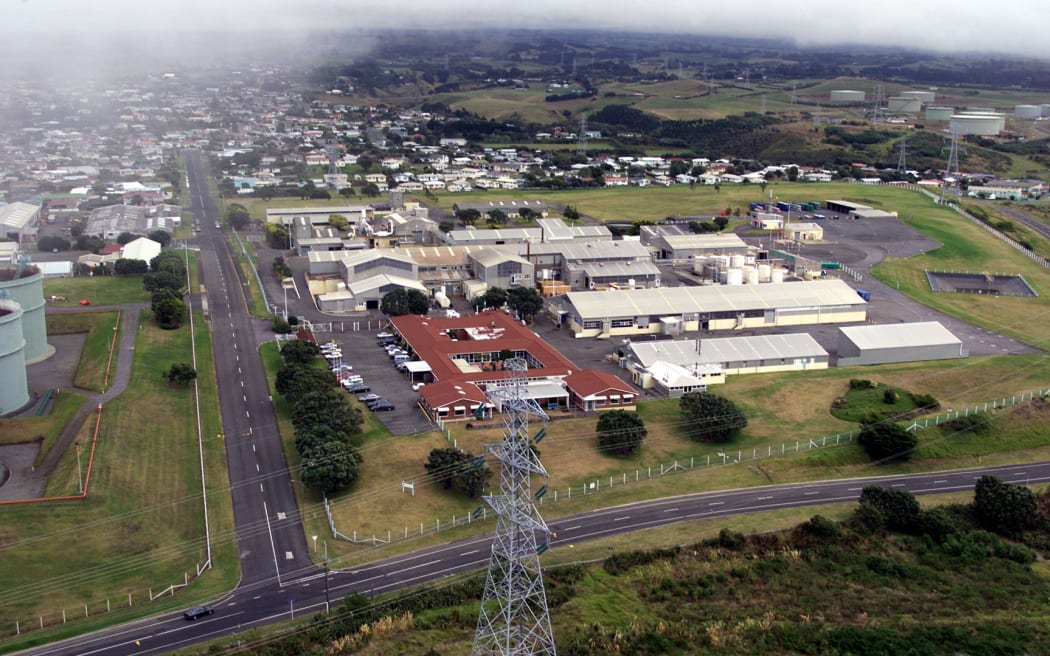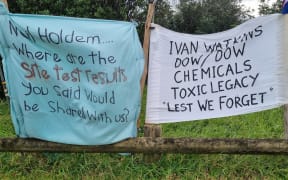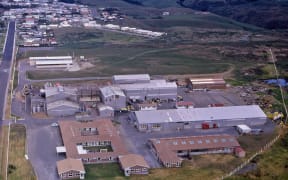
The DOW Agroscience plant in Paritūtū, New Plymouth pictured on 15 February, 2001. Photo: Getty Images / David Hallett
Global chemicals giant Dow says public input has influenced where it will begin taking soil samples at the site of its controversial former chemicals plant at Paritūtū in New Plymouth.
From the 1960s through to 1987, Ivon Watkins (later Ivon Watkins-Dow) made the herbicide 2,4, 5-T at Paritūtū. The herbicide was a key component of Agent Orange - the defoliant used by the US military in the Vietnam War - which has been linked to cancers and birth defects.
The chemical plant was demolished earlier this year and Dow and its New Zealand-based remediation partner Tonkin + Taylor are in phase two of a five phase clean-up expected to take several years.
In June, Dow surveyed former staff and neighbours of the plant aiming to gather any information about how chemicals were handled at the site, which might not have been previously recorded.
In a project update, Dow Australia and New Zealand Environmental Remediation Leader Camillo Coladonato said about 70 "mostly constructive" responses had been received to the survey.
"Our local remediation partner Tonkin + Taylor conducted follow-up discussions with some survey respondents and those discussions have helped to further refine our understanding of the site history."
Coladonato said Tonkin + Taylor had begun preliminary work for taking soil samples on the site which would focus on areas identified from past activities and that public input.
Former employees and contractors accounted for 60 percent of the survey respondents and included scaffolders, welding inspectors, cleaners, lab technicians, process chemists, production engineers and accountants.
The longest serving staff member who responded had worked at Paritūtū for 33 years.
Almost 30 percent of those who took part in the survey were past or present residents and 10 percent of the former staff who responded also lived in the area.
People who worked at businesses nearby made up 7 percent of respondents and another 7 percent had friends or relatives who worked there.
More than 1800 people visited the survey's web page and about 650 were delivered to homes and businesses nearby inviting people to take part.
Dioxins campaigner Andrew Gibbs said the survey may have come too late to capture anything meaningful.
"It's great that they are talking to the public, but we need to be mindful that some of these events date back to the mid-60s and these people would be heading into the 80s.
"So, a lot of the people who know about the era when there were high dioxin levels in the product are probably getting pretty aged by now or perhaps have passed on."
Gibbs said Dow's update was light on detail and he would like to see more transparency about information the company held about any previous testing done on the site.
Coladonato, meanwhile, was pleased with progress being made to remediate the Paritūtū site, although he acknowledged that some people may be concerned about the pace of progress.
"To achieve the best outcome for the site, and for tangata whenua and people of New Plymouth, we need a detailed and considered approach and consistent application of best practice and this takes time."
He said the appointment of a peer reviewer for the remediation process would be an important next step.
"The Taranaki Regional Council is in the final stages of selecting an independent peer reviewer, and we are looking forward to the appointment, and the robust, independent oversight for delivery of the remediation which will follow."
The reviewer's role is to provide expert advice on processes and implementation of the published Remediation Plan to the Regulators and community representatives.
The annual groundwater sampling as per its consents conditions would take place in early October.
Coladonato said Dow was closely engaging with stakeholders including Te Atiawa and Taranaki Iwi (as they developed their vision for the site), the New Plymouth District Council and the Taranaki Regional Council.
"We are grateful for their support and remain fully committed to co-operation with local agencies."
He said an example of this co-operation, was Dow offering access to its land to Transpower to assist in removing redundant high voltage power lines and pylons, minimising disruption for the community beyond the fence line.




